What is Enterprise Sales?
Enterprise sales, commonly known as complex sales, involves the acquisition of substantial contracts characterized by extended sales durations, numerous stakeholders, and greater risk compared to conventional sales.

Table of contents
- What is Enterprise Sales?
- Why Is Enterprise Sales Important?
- What Are The Benefits Of Enterprise Sales?
- What Are The Four Stages Of Enterprise Sales?
- Key Challenges Of An Enterprise Sales Process
- How Does Enterprise Sales Differ From Self-Service And Transactional Mid-Market Sales?
- How Do You Implement An Enterprise Sales Model?
- Who Is Part Of An Enterprise Sales Team?
- How Can Businesses Build An Enterprise Sales Strategy?
- What Are The Most Important Enterprise Sales Metrics To Measure?
- What’s The Future Of Enterprise Sales?
In other words, enterprise sales mainly deal with business solutions for larger companies.
Many startups, during their initial phases, prioritize transactional sales because they generally pose less risk, have quicker sales processes, and are powered by both marketing and sales efforts.
In this glossary, you will learn about:
- Why enterprise sales is important and its various benefits
- The four stages of an enterprise sales process
- The key challenges of an enterprise sales process
- How enterprise sales differ from smaller and mid-market sales processes
- Key facets of an enterprise sales model
- Key people involved in an enterprise sales process
- The process of building a successful enterprise sales strategy
- Sales metrics you need to consider
Why Is Enterprise Sales Important?
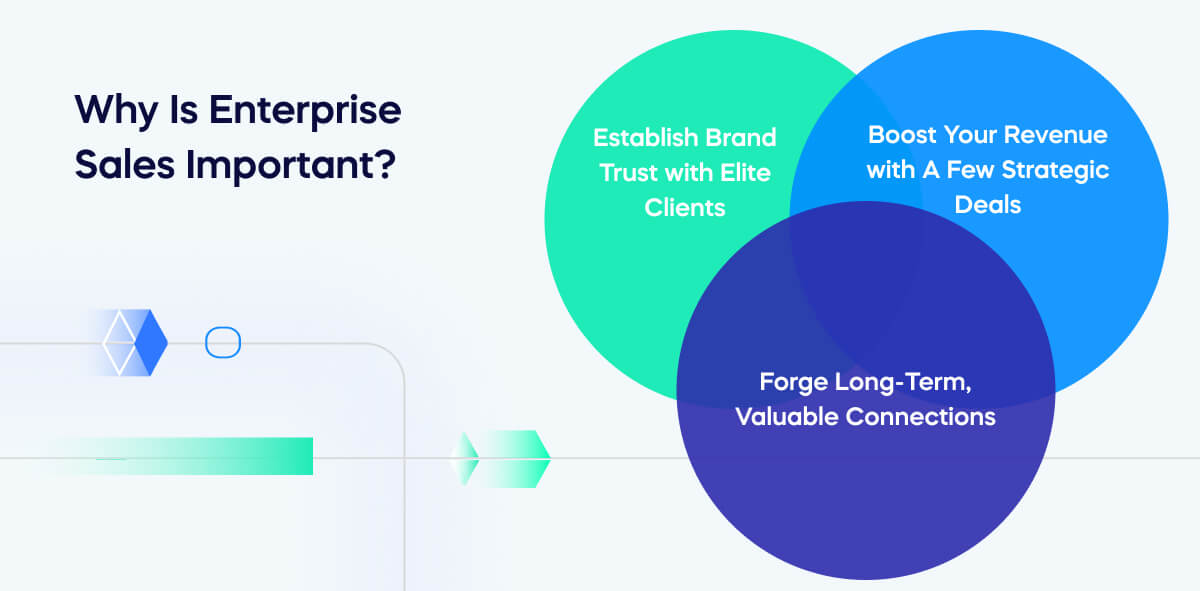
Many businesses and sales professionals see enterprise sales as a chance to:
Establish Brand Trust with Elite Clients
Securing deals with giants like Cisco, Apple, Disney, or HP bestows your company with a mark of prestige and can set the wheels of momentum in motion.
Boost Your Revenue with A Few Strategic Deals
Given the magnitude of these deals, enterprise sales can lay down a robust revenue foundation. This income is consistent as it’s recurrent, and as you further penetrate and expand within these organizations, your revenue stream grows, building on the products already adopted by these clients.
Forge Long-Term, Valuable Connections
Enterprise transactions only materialize when genuine value is added to relationships. Through the lengthy enterprise sales cycle, which can span several months, and during the extended duration of the enterprise technology buying contracts, often lasting years, we cultivate deep and enduring relationships that are truly significant.
What Are The Benefits Of Enterprise Sales?
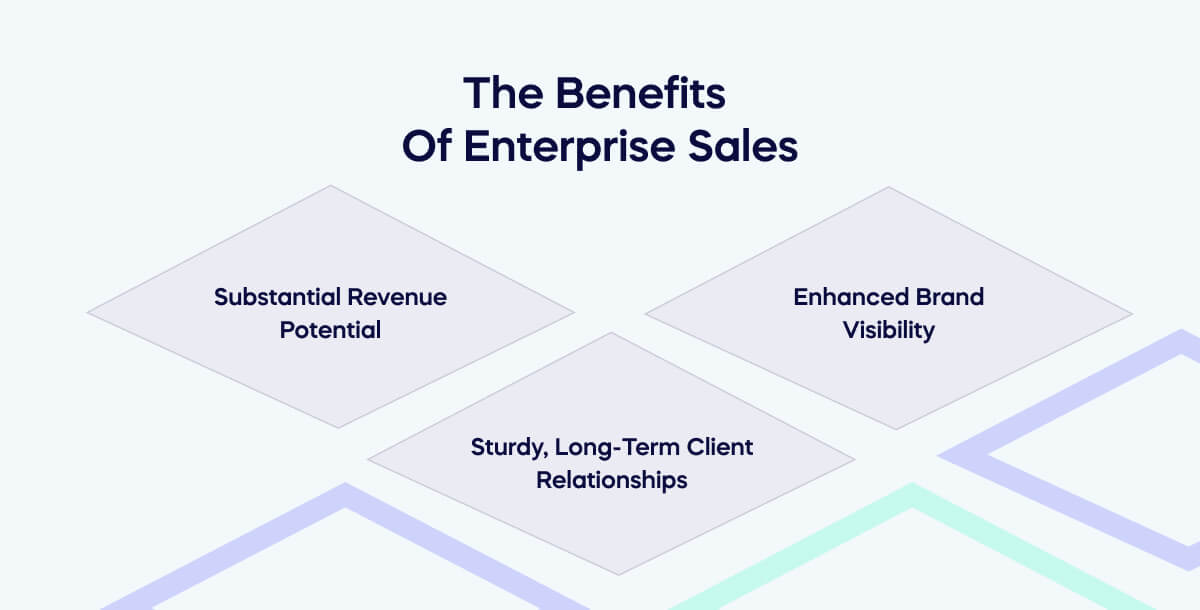
Navigating the intricacies of enterprise selling might seem daunting, considering the intricate processes and substantial effort involved. However, the endeavor is more rewarding than it initially appears.
Here are three compelling reasons why B2B enterprises prioritize and value enterprise sales:
Substantial Revenue Potential
Enterprise sales target heavyweight clients boasting significant budgets, often dwarfing SMBs. While securing enterprise clients might demand a heftier initial investment, the long-term returns, in terms of customer lifetime value, can be remarkably lucrative.
Such contracts can not only bolster your revenue stream but also elevate your company’s overall valuation.
Enhanced Brand Visibility
Securing a contract with a renowned enterprise invariably amplifies your brand’s credibility. Once a prominent enterprise endorses your services or products, it’s a feather in your cap that can pique the interest of both mid-tier and smaller businesses.
Elevating your brand to a thought leadership pedestal is pivotal in clinching enterprise deals, and while it demands concerted efforts, it lays a robust foundation for sustained brand prominence. This not only heightens brand recognition but also streamlines the acquisition of both enterprise and mid-tier clientele.
Sturdy, Long-Term Client Relationships
Enterprise clientele, by nature, seek and foster stable, long-standing associations with their service providers. Thus, adopting an enterprise sales strategy opens doors to enduring partnerships that promise consistent profitability over extended periods.
What Are The Four Stages Of Enterprise Sales?
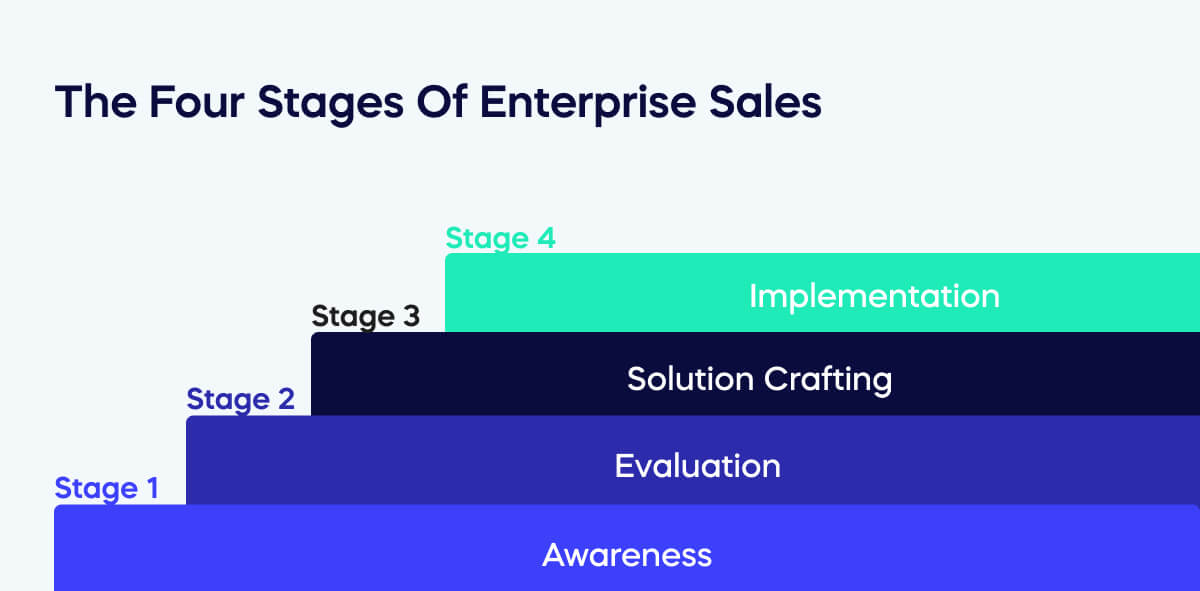
The sales funnel determines the journey of potential clients. Grasping its intricacies can pinpoint weaknesses in your sales approach, like discerning where potential clients waver and understanding their reasons for not proceeding.
Without comprehending the nuances of the enterprise sales funnel, sales professionals risk overlooking key opportunities.
Awareness
At the funnel’s inception is the awareness phase. Here, individuals are introduced to a company for the first time, and companies recognize their potential clientele.
Sales representatives delve into a potential client’s business profile, discuss their needs, and assess the viability of a partnership.
For instance, the awareness phase might involve a potential client learning about your offerings through an advertisement, a blog post, a search engine, or word-of-mouth.
This initial interaction sets the stage for subsequent interactions, so marketing endeavors must be impactful and cater to the intended audience.
Evaluation
Following the awareness phase, sales reps should have gleaned insights into the challenges faced by the potential client and their desired solutions.
Now, the task at hand involves analyzing these challenges and charting out an appropriate response.
Practical evaluation involves probing — asking pertinent questions about their business landscape, prevalent challenges, and expectations. This dialogue aids in comprehending:
- The primary challenges they face.
- How your offerings can address these challenges.
- Ways to tailor your solutions for a bespoke fit.
- The roadmap to sealing the deal.
- The stakeholders involved.
Solution Crafting
The subsequent phase termed the solution crafting phase, revolves around leveraging your domain expertise and insights into the client’s challenges to conceptualize potential solutions.
Given the multifaceted nature of enterprise sales, this often demands innovative solutions.
This phase provides an avenue to collaborate with potential clients, customizing solutions and underscoring your unique value proposition.
The emphasis lies in highlighting your unique offerings and how they address the client’s needs.
Collaborative solution crafting ensures the resulting proposal is completely tailored to the client’s organizational landscape.
Implementation
Concluding the enterprise sales funnel is the implementation phase. After the client endorses your proposal, your team embarks on deploying the proposed solution. This entails monitoring its efficacy, gauging its impact, and iteratively refining it over time.
Key Challenges Of An Enterprise Sales Process
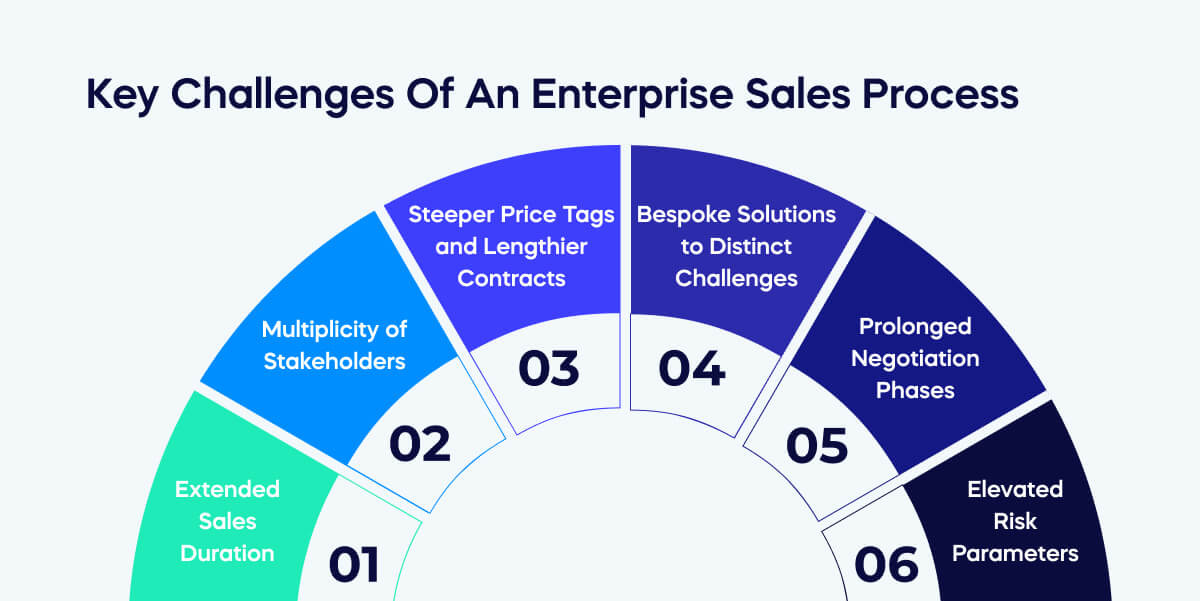
Nobody should be surprised. The bigger the deal, the more intricate the sales journey becomes.
Among various sales types, enterprise sales stand out as the most protracted and intricate. It demands increased interaction, superior tactics, and an extended blueprint compared to customary SMB sales.
Here are six typical hurdles faced by enterprise sales teams:
Extended Sales Duration
While the intricacy and cost of the solution escalate, so does the duration of the sales cycle in enterprise sales. The more complex and pricier the solution, the more time it takes to sell.
These elongated cycles, often stretching across several months or quarters, make monthly and quarterly forecasts more unpredictable.
Not only is securing the initial contract challenging, but morphing that connection into a lasting partnership is a strategic long-term play – albeit one that can yield significant rewards.
Multiplicity of Stakeholders
The magnitude of the deal is directly proportional to the number of decision-makers and stakeholders. Many individuals, ranging from tech enthusiasts and fiscal consultants to managerial heads, get drawn into the enterprise sales vortex.
The challenge isn’t just the sheer number of individuals but the diverse opinions they bring. On average, a B2B purchase decision engages around 5.4 customer stakeholders.
As transactions become more labyrinthine, representatives from various customer sections contribute their insights.
Each mirrors varied business aspects, bound by unique metrics, agendas, and buying parameters.
Achieving a unanimous decision amongst them is easier envisioned than executed. However, such diverse participation ensures comprehensive dialogues and fruitful outcomes.
Steeper Price Tags and Lengthier Contracts
As the deal’s complexity and perceived peril amplify, so does its financial aspect and the contract’s sophistication.
In the enterprise sales realm, contracts, due to their intricate nature, are usually exhaustive. Navigating these premium deals and multifaceted contracts requires a seasoned sales expert.
Bespoke Solutions to Distinct Challenges
Enterprise sales often entail tailoring products or services to meet client specifications. For instance, tech firms might develop or modify software to meet a business’s requirements.
Crafting such custom solutions demands a blend of tech understanding and a deep grasp of the client’s vision.
This entails mobilizing internal teams, including product, finance, and top-tier leadership, to ensure the viability, profitability, and alignment of the venture with expectations.
Prioritizing bespoke solutions grounded in individual client challenges showcases a commitment to delivering unmatched value.
Prolonged Negotiation Phases
A heftier deal inevitably results in more intricate negotiations, which invariably stretch the negotiation timeframe. Some matters demand extensive deliberation.
To proficiently steer through prolonged negotiations, it’s imperative to approach each session with strategies to advance the deal.
Establish a clear roadmap, recall key points from preceding discussions, and ensure every dialogue is both purposeful and efficient.
Elevated Risk Parameters
Aiming high entails venturing more. However, these amplified risks must be discerningly undertaken – a single error could jeopardize the entire deal.
High-end consumers are wary of investing excessively in an unfit product or service, and businesses aim to offer solutions that meet client objectives.
Firms must vouch for their product’s robustness, streamline their methodologies, and guarantee their salesforce is adept and ready to excel.
How Does Enterprise Sales Differ From Self-Service And Transactional Mid-Market Sales?
In the vast landscape of sales, three distinctive categories emerge:
Self-Service Sales
This model empowers customers to make purchases without directly interacting with a sales representative.
It leverages tools such as standardized pricing pages, chatbots, and comprehensive user manuals. The entire process is automated, eliminating the need for human intervention.
While the deals often reflect a lower monetary value (many would hesitate to spend more than a few hundred dollars without a human touchpoint), the large volume and speed of transactions can be staggering. It’s not uncommon for hundreds of sales to materialize daily.
Transactional Sales
Positioning itself above self-service, transactional sales cater to individuals or smaller businesses. Although these sales are straightforward and can conclude swiftly, they frequently involve a sales rep.
The representative’s role might range from elucidating product features to assisting buyers in their initial steps.
Enterprise Sales
At the pinnacle of complexity and value, enterprise sales operate in a league of their own. These deals dwarf those of transactional and self-service sales in both intricacy and worth.
Consequently, the time to seal such deals stretches longer, and the demand on your sales team intensifies.
Let’s dig deeper into how self-service and transactional differ from enterprise sales:
Self-service and mid-market sales focus on addressing immediate needs – be it of an individual or a business. Transitioning to the enterprise sphere, the lens shifts towards forecasting potential requirements for the forthcoming years.
Enterprise sales representatives must cultivate a profound understanding of their domain. This includes a thorough grasp of the competition, discerning where they stand in comparison, gauging the account’s needs, and ensuring alignment with what rivals offer.
Their counterparts in SMB and mid-market sales face less pressure to fathom the grander scheme of things, centering their attention mainly on the immediate phase of their leads.
Furthermore, the hefty lifetime value (LTV) of enterprise customers sanctions a resource-heavy approach, even if it elevates the customer acquisition cost (CAC and customer retention.
Contrastingly, when dealing with SMBs or mid-market sales, it’s paramount to integrate more automation or a streamlined sales procedure, considering the relatively modest LTV of the average customer.
How Do You Implement An Enterprise Sales Model?
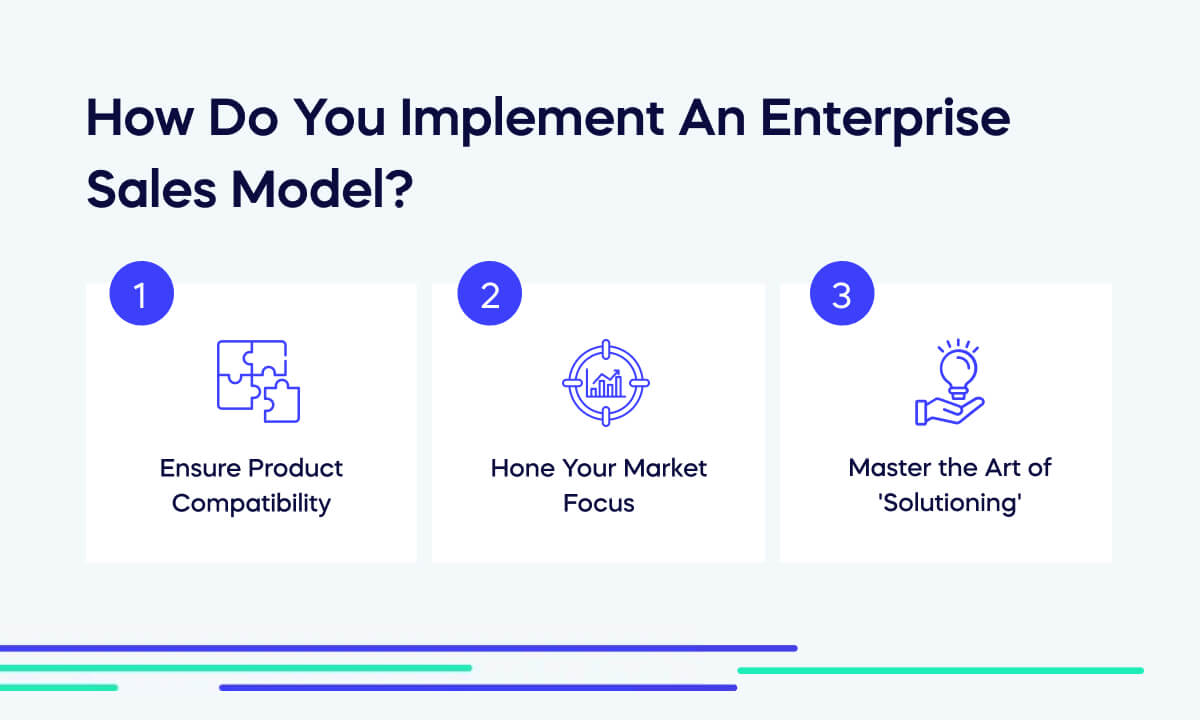
Are you venturing into enterprise sales? Here are some tips and tricks on successfully implementing an enterprise sales model for your business.
Here’s your roadmap:
Ensure Product Compatibility
Venturing into the enterprise domain isn’t merely about possessing a stellar product. The question is – is your product attuned to the enterprise ecosystem?
Many promising products may dazzle in the commercial sector but falter in the enterprise realm.
Sometimes, it’s a misalignment with enterprise concerns, while often, it boils down to scalability. Does your product cater to thousands seamlessly? Can it manage millions of interactions daily?
Hone Your Market Focus
Enterprise sales isn’t a simple strategy; it’s about discerning selection. The dilemma lies in which accounts to pursue and which to bypass.
Aim for precision and proactivity. As an account executive eyeing the enterprise arena, if you’ve secured a top-tier company, it’s unrealistic to juggle many other accounts.
The enterprise domain is rife with the allure of overextension. Resist this by anchoring yourself where the probability of success is paramount, sidelining distractions.
Master the Art of ‘Solutioning’
While commercial sales to smaller businesses often involve a consistent sales script with minor tweaks, the enterprise landscape demands a more tailored approach.
It isn’t about superficial customization of presentations; it’s about profound empathy. Understand your client’s unique challenges, market positioning, and growth trajectories.
By delving deep into these nuances and collaborating with key stakeholders to address their pain points, you transition from being a mere vendor to a strategic partner.
This approach, termed ‘solutioning,’ metamorphoses enterprise sales reps into consultants or invaluable advisors.
Who Is Part Of An Enterprise Sales Team?
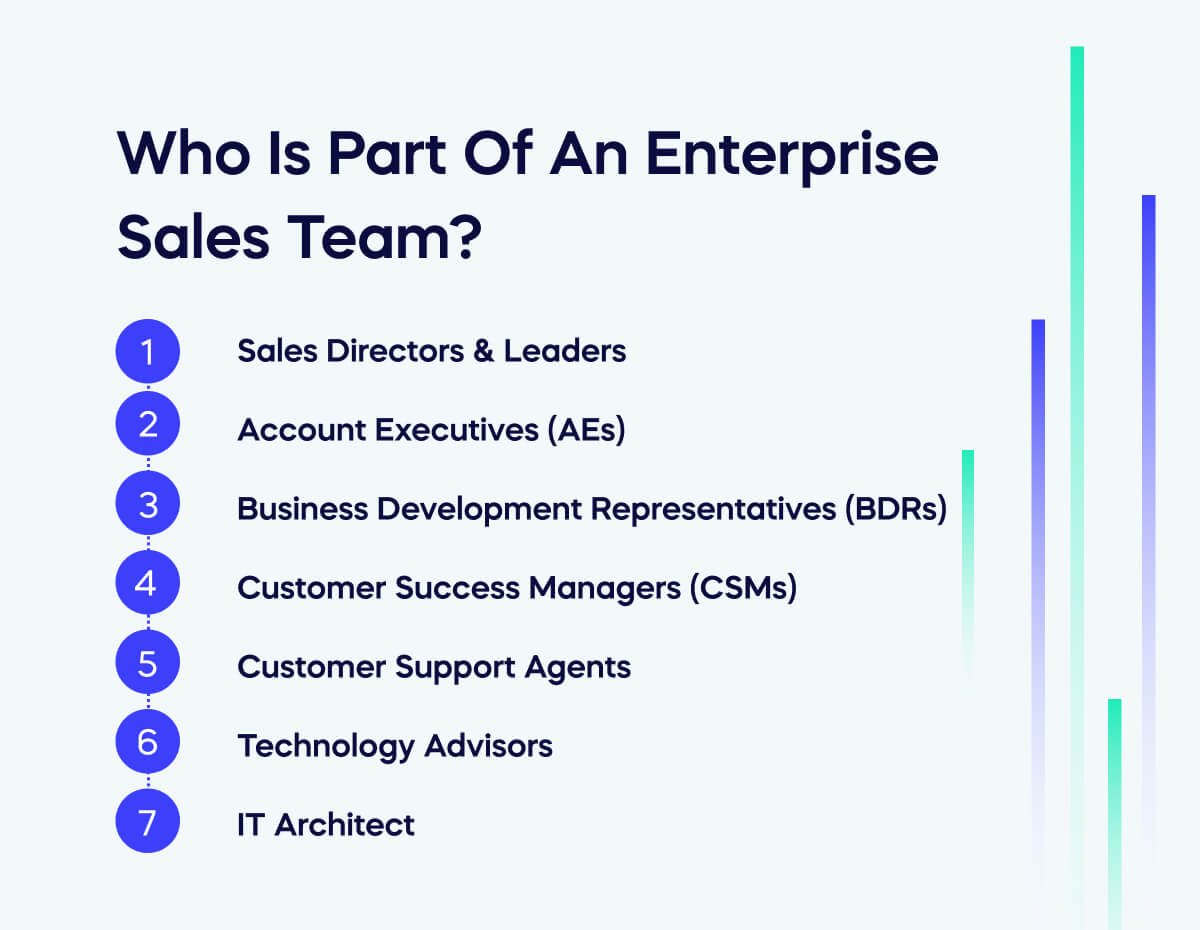
A top-tier enterprise sales team doesn’t materialize out of thin air; it emerges from deliberate choices about your sales methodology, technological suite, and hiring.
A team without experience and talent might overlook potential prospects and let opportunities slip away.
Structuring the ideal enterprise sales team hinges on your specific business needs and the preferences of your sales personnel.
However, specific roles are indispensable to address the distinct challenges of enterprise sales:
Sales Directors & Leaders
Sales directors shape the broader sales vision, supervising junior sales staff and determining the business’s overarching sales plan. Typically ensconced in the upper echelons of management, they have overarching authority over sales operations and personnel.
While sales managers oversee and guide a team of salespeople, sales directors helm sales managers. While managers liaise with their teams and report upwards, directors coordinate from a macro level, deciding on strategy and ensuring its enactment.
Account Executives (AEs)
As individual sales agents, AEs sustain existing clientele and finalize transactions with potential customers. They have set revenue goals and earn through commissions.
Reporting to sales managers, large enterprise sales squads may be clustered by regions, industries, or specific company solutions.
Business Development Representatives (BDRs)
BDRs catalyze new business avenues by identifying, prospecting, and vetting potential leads to engage with likely purchasers.
BDRs usually initiate preliminary discussions with incoming leads to offer AEs a detailed backdrop for tailored pitches. Their role also encompasses proactive outreach to cultivate a robust sales pipeline.
Customer Success Managers (CSMs)
CSMs assist customers in their evolution from prospects to dedicated users. Their pivotal role during customer onboarding entails customized support training and guidance.
Dedicated to fostering customer allegiance, they nurture enduring ties with clients, ensuring their growth and consistent engagement with the business.
Customer Support Agents
Serving as bridges between the company and its clientele, these agents manage many customer concerns, ranging from technical glitches and order updates to billing issues.
Their primary aim is upholding exceptional customer service standards and ensuring client contentment and trust.
Technology Advisors
Sales personnel lean on technology advisors to elucidate product intricacies and finalize deals.
These advisors elucidate product features integration intricacies and underline the product’s relevance for the client’s tech segment.
They stay updated on evolving sales technologies, liaising with sales team members to pinpoint challenges and offer tech-based solutions.
IT Architect
IT architects orchestrate high-level blueprints for diverse IT components, from business systems and apps to the full enterprise spectrum.
Their domain encompasses IT services, communication pathways, cybersecurity, networking, storage, and more.
How Can Businesses Build An Enterprise Sales Strategy?
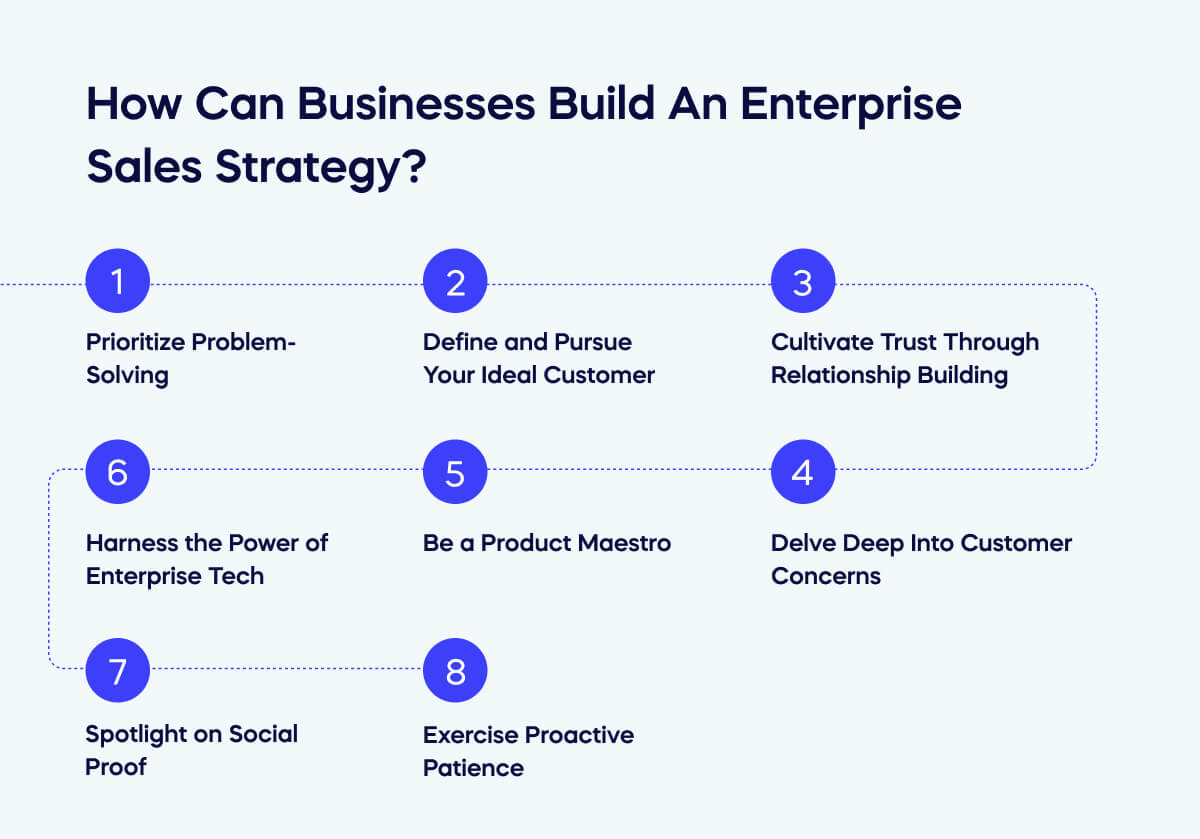
For those wanting to build a successful strategy in enterprise sales, a fusion of tenacity, resilience, and the mastery of specific sales strategies is crucial.
Here are eight key strategies to elevate your prowess in enterprise sales:
Prioritize Problem-Solving
Rather than merely highlighting features, the crux lies in presenting solutions. Beyond marketing and training, the essence of sales is to ease your client’s challenges.
Stand out by being the remedy, ensuring client satisfaction that transforms them into steadfast promoters.
Define and Pursue Your Ideal Customer
While sales often play the numbers, genuine connections with promising leads can be the real game-changer. Elite sellers adhere to strict qualifying criteria, sifting through prospects that resonate with their ideal customer profile.
They are astute in identifying and bypassing ill-fitting leads, conserving their energies for promising engagements.
Cultivate Trust Through Relationship Building
The cornerstone of sales is trust. Especially in enterprise sales, where stakes are high, cultivating rapport is paramount. Through empathetic interactions, active engagement, or showing genuine concern, fostering trust can be a pivotal factor in sales success.
Delve Deep Into Customer Concerns
True comprehension of customer obstacles goes beyond the immediate pain points your product addresses.
To truly resonate, dive into the broader challenges, industry-specific issues, and their decision-making labyrinth. The deeper your insights, the more poised you are to tailor a compelling solution.
Be a Product Maestro
In-depth product knowledge can tip the sales scales in your favor. Ensuring sales reps are well-versed with product intricacies not only boosts their confidence but equips them to handle varying sales scenarios.
Continuous training is key. Tools like Walkme can be instrumental, offering real-time tips and product walkthroughs.
Harness the Power of Enterprise Tech
Effective utilization of enterprise-grade CRM software can be transformative. From meticulously tracking sales progression to providing a holistic view of customer interactions, these tools enhance forecast accuracy.
Solutions like CRM, Contract Management, and Sales Analytics Tools consolidate data, providing invaluable insights to steer company strategies.
Spotlight on Social Proof
In an era where peer opinions heavily influence decisions, social proof is invaluable. Showcasing positive customer feedback, partner testimonials, and high-rated reviews can greatly bolster your credibility, making prospects more receptive to your pitch.
Exercise Proactive Patience
The enterprise sales realm demands a diligent approach. It’s pivotal to remain thorough and attentive throughout the elongated sales cycle.
Nurturing the relationship pre-sale can reap long-term dividends, fostering buyer trust and lasting partnerships. In enterprise sales, it’s not about the sprint but the marathon.
What Are The Most Important Enterprise Sales Metrics To Measure?
Metrics play an indispensable role in any business endeavor, but they take on amplified significance in enterprise sales. When navigating large-scale deals laden with intricate details and inherent risks, sales leaders can’t merely lean on gut feeling.
Understanding and leveraging these metrics can equip businesses to optimize their strategies, align their objectives, and maximize their sales outcomes.
In enterprise sales, informed decision-making backed by data is paramount. Thus, top-tier companies diligently track, assess, and refine every facet of their market approach, sales blueprint, and team performance.
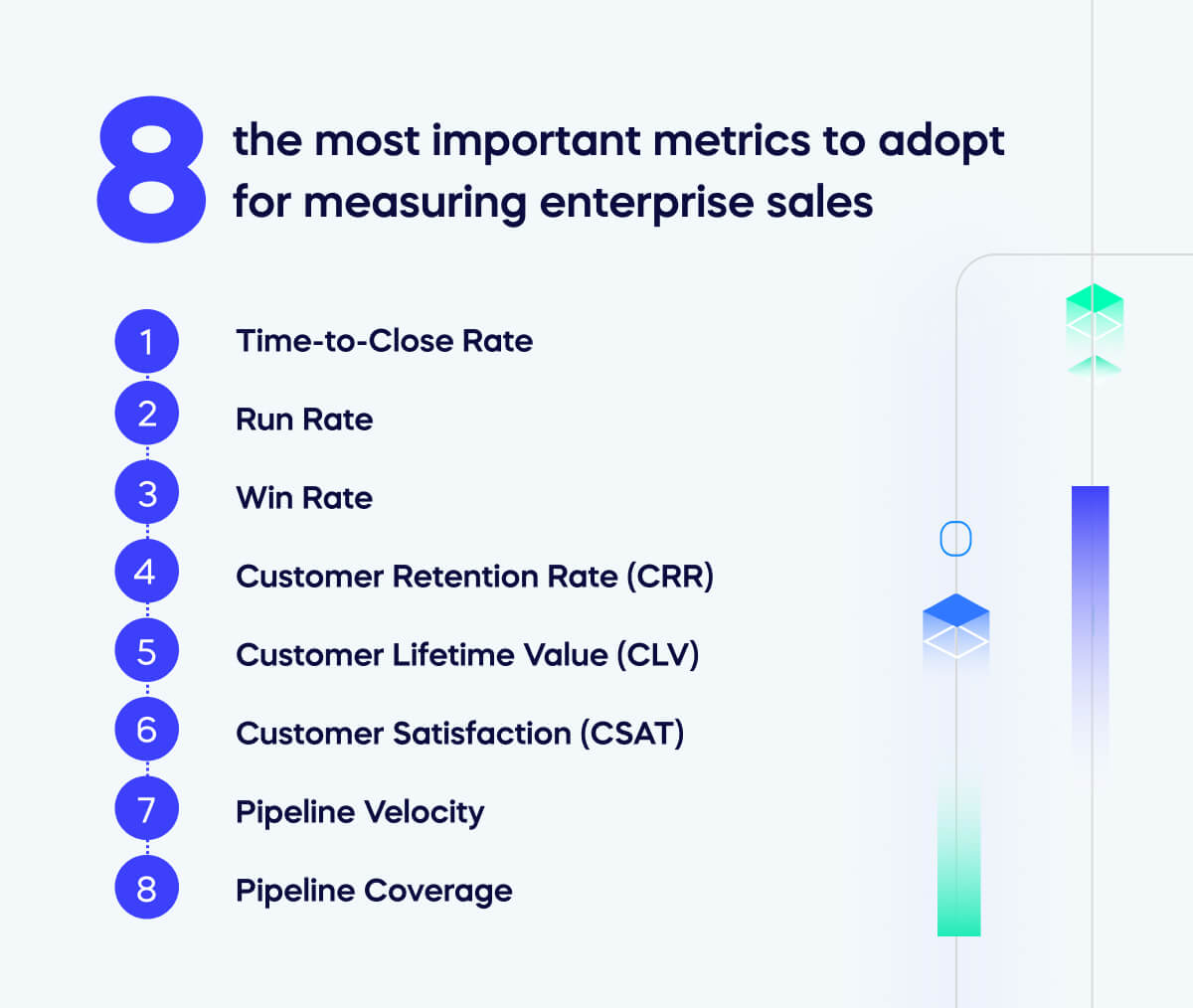
Here’s a rundown of 8 pivotal enterprise sales metrics:
Time-to-Close Rate
Definition: This metric gauges the efficiency of sales reps or teams by determining the duration required to shepherd a deal from its inception to its conclusion.
Formula: (Sales during the period) ÷ (Number of quotes sent during that period)
Run Rate
Definition: The run rate projects potential revenue for an extended timeframe based on historical financial data.
Formula: (Revenue in the period) ÷ (Number of days in the period) x 365
Win Rate
Definition: It represents the fraction of potential deals culminating in a successful closure.
Formula: (Number of successful deals) ÷ (Total number of qualified opportunities)
Customer Retention Rate (CRR)
Definition: CRR showcases the percentage of existing customers who remain affiliated with a company over a designated period.
Formula: [(End customers – New customers) ÷ Starting customers] x 100
Customer Lifetime Value (CLV)
Definition: CLV quantifies the average revenue a business expects to get from a customer throughout their business relationship.
Formula: Customer value x Average duration of customer relationship
Customer Satisfaction (CSAT)
Definition: Ascertained via customer feedback, CSAT measures the contentment levels of customers. Feedback mechanisms include surveys, prompts, or embedded website/app forms.
Formula: (Number of particular ratings) ÷ (Total responses) x 100
Pipeline Velocity
Definition: This metric offers insights into the speed at which leads transition through the sales pipeline. It aids in predicting sales based on live data.
Formula: (Number of opportunities) x (Deal value) x (Win rate %) ÷ Duration of sales cycle
Pipeline Coverage
Definition: This metric evaluates the depth of a sales team’s pipeline and quantifies the number of validated leads required to attain their targets.
Formula: (Total value in the pipeline for a period) ÷ (Sales quota for that period)
What’s The Future Of Enterprise Sales?
Navigating the world of enterprise sales – often dubbed complex sales – requires a tailored strategy, especially when working with mammoth contracts and large-scale clients.
These sales tend to be characterized by prolonged sales cycles, increased stakeholders, sizeable contracts, and a heightened level of risk.
To understand the essence of enterprise sales, envision it through the lens of magnitude. Engaging with enterprise corporations means interacting with expansive entities boasting hundreds of staff members, multimillion-dollar revenues, and specialized departments, each with distinct goals and aspirations.
This sheer scale is what sets it apart from sales to smaller entities.
Selling to small or mid-sized businesses usually means a streamlined, transactional sales process. The perks include concise sales cycles, limited touchpoints, and a focus on off-the-shelf solutions that don’t require extensive customization.
In contrast, enterprise sales is a more intricate dance.
It often involves lengthy negotiations with a chorus of decision-makers, delving into intricate sale specifics and navigating various concerns – some of which might clash.
Critical aspects of enterprise sales entail crafting bespoke solutions tailored to the client’s needs, ensuring your offering seamlessly integrates, and adding value without upending their operations.
Nevertheless, the labor-intensive nature of enterprise sales often bears fruit in lucrative rewards. While quicker, transactional sales to smaller businesses might be tempting, the revenue from such endeavors pales compared to the potential of a significant enterprise deal.
A half-year negotiation investment could culminate in a six or even seven-figure contract, justifying the effort and time. Certainly, enterprise sales demand a hefty time investment and carry an inherent risk of deals going awry.
However, with a solid grasp of the intricacies of enterprise sales, targeting industry giants could be the most rewarding and economically efficient strategy in your arsenal.